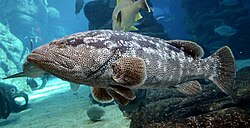Epinephelus malabaricus
| Malabar grouper | |
|---|---|
 |
|
| Epinephelus malabaricus in uShaka Marine World | |
| Scientific classification | |
| Kingdom: | Animalia |
| Phylum: | Chordata |
| Class: | Actinopterygii |
| Order: | Perciformes |
| Family: | Serranidae |
| Genus: | Epinephelus |
| Species: | E. malabaricus |
| Binomial name | |
|
Epinephelus malabaricus (Bloch & Schneider, 1801) |
|
| Synonyms | |
|
List
|
|
The Malabar grouper or greasy grouper, Epinephelus malabaricus, is a species of marine fish in the family Serranidae.
The Malabar grouper is widespread throughout the tropical waters of the Indo-West Pacific area from the eastern coast of Africa to the Tonga Islands, Red Sea included. It has also been recorded in the Levantine Sea and the eastern Mediterranean, as a Lessespian migrant through the Suez Canal, although it is still rather rare in the Mediterranean. This grouper lives in various habitats, such as lagoons, mangroves, coral and rocky reefs, sandy and muddy bottom areas, between 2 and 150 m deep. The juveniles prefers lagoon or brackish areas.
The Malabar grouper can reach a length up to 234 cm (92 in), but average size is usually around 100 cm (39 in). It has a light grey to light brownish background color, with a number of dark brown spots randomly scattered, which increase in number with age. The body has also a various number of brown diagonal stripes. Younger fish have a number of wide, broken vertical bands of darker shade across their bodies, but in maturity they seem to become a uniform darker colour. Young fish have numerous brown spots. The tail fin is rounded.
Epinephelus malabaricus is a protogynous hermaphrodite, as these fishes at some point in their lifespan change sex from female to male. Malabar grouper are voracious predators, they feed on fish, crustaceans, and occasionally, cephalopods.
As most fish, the Malabar grouper harbours a variety of parasites, including the diplectanid monogeneans Pseudorhabdosynochus manifestus, P. maaensis, P. malabaricus, P. manipulus, P. marcellus, and P. maternus.
...
Wikipedia

